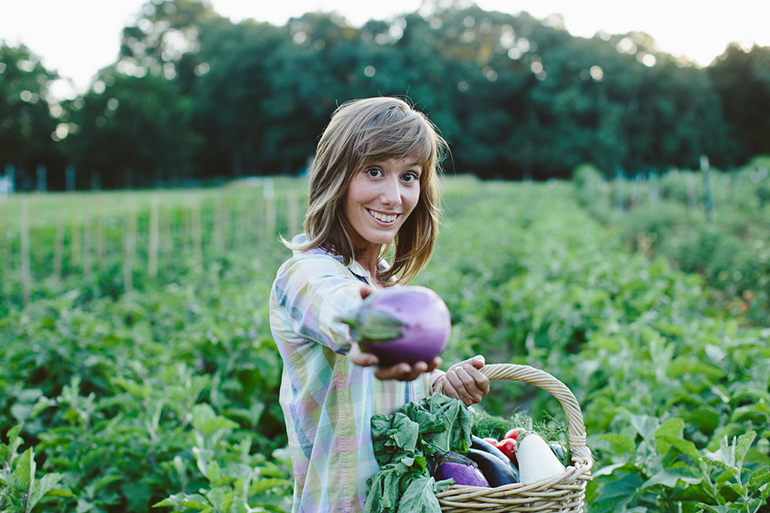Cristina Cosentino Returns to Her Sylvester Manor Roots

Some of the greatest stories are the ones where the protagonist comes full-circle, returning to the place that kick-started their adventure with honed skills and a greater appreciation for their humble beginning. Cristina Cosentino’s journey began as an apprentice at Shelter Island’s Sylvester Manor Educational Farm, where she now serves as its first-ever Director of Farm Operations.
Cosentino dabbled in food production from 2011–2015, working on three different farms and spending some time in the New York City wine business. During this period, she had been mulling over when would be the right time to shift her focus to Sylvester Manor’s acclaimed apprenticeship program, and in 2015, she hastily decided the time was right. “The apprenticeship basically changed my life,” Cosentino says. “It was kind of the springboard for my whole career.”
As an apprentice, she lived on Sylvester Manor’s farm, worked a full workweek as a farmhand and was paid for her tireless efforts. “We were the ones actually taking care of the farm on the day-to-day—everything from seeding in the greenhouse to planting, weeding and harvesting; working the farm stand; taking care of the animals,” she explains. “We did it all!” This hands-on learning approach was paired with more traditional educational components including lectures and guided tours of participating farms through the C.R.A.F.T. (Collaborative Regional Alliance for Farmer Training) program. By the time she completed her apprenticeship, Cosentino couldn’t bear to leave Sylvester Manor, so she took a unique opportunity to continue her time there, this time focused on tractor and farm machinery maintenance.
Ready to spread her wings beyond Shelter Island, Cosentino put her tractor skills to practice at the H.O.G. Farm in Brookhaven; managed production, operations and sales for Acabonac Farms; and managed a vegetable market garden in Rhode Island. After several successful years of farming along the East Coast, she heard the call to return to the place where her passion for farming first flourished—Sylvester Manor. This year, she begins her tenure in the newly created Director of Farm Operations position, a managerial role that entails running the apprenticeship program; managing the day-to day of the vegetable field and animals; satisfying Community Supported Agriculture (CSA) members, farm stand customers and the restaurants the farm works with; and overseeing implementation of the farm’s 2019 expansion, which effectively tripled its tillable acreage.

The first item on Cosentino’s long list of new job to-dos is ironing out the details of this year’s crop plan—what’s being grown, how many of each, where, when and how. “The whole season is pretty much planned out before we even plant the first seeds,” she says. “[My goal is to] increase our production and do it in a way that aligns with our principles—making sure we’re still implementing regenerative practices.” One such sustainable farming method she envisions is the use of sheep and goats to rid the woodlands and pastures of the invasive species that plague them. “When you’re planning your farming methods and your business, I think it’s important that people recognize that taking the slower route on improving our land, our soil and our water when producing food, might not seem like it’s generating a higher return immediately, but there’s a lot of intangible value and a lot of slow-term intrinsic value on your investment that we’re capable of creating,” she explains. “This isn’t easy, but it’s a viable occupation. You have to definitely approach it from a business perspective—so lots of planning, crunching numbers and forethought go into it. But it’s the most rewarding job I’ve ever had, that’s for sure.”
Founded as a nonprofit in 2009, the Sylvester Manor Educational Farm has evolved a great deal since the estate’s 1652 inception as a provisioning plantation. Today, the multi-faceted operation offers educational programming, history exhibits, concerts, parties and other events on more than 200 acres of farmland, pastures, gardens, woodlands and manor grounds. Both the CSA, which has grown to include more than 120 farm-supporting families, and the farm stand, which community members flock to in the spring and summer months, highlight what Cosentino loves most about her job. “I like feeding people—I’m Italian,” she says. “That connection when you’re handing the vegetable, fruit or protein to a customer, family member or friend, that’s definitely the moment when I feel like this is all worth it.”
Unlike an internship, the Sylvester Manor apprenticeship program wasn’t grooming Cosentino to stay and work onsite indefinitely—it prepared her for a fulfilling career in farming wherever she chose to pursue it. She chose Shelter Island. “I feel like the poster child for the apprenticeship program,” Cosentino says. “I did the apprenticeship, went on to work on other vegetable farms, then managed the back pastures with Acabonac Farms, who was leasing land from Sylvester Manor, and now I’m coming back like I never left.”
To learn more about Sylvester Manor Educational Farm and how to join the CSA, which opens to new members in February, visit sylvestermanor.org.









